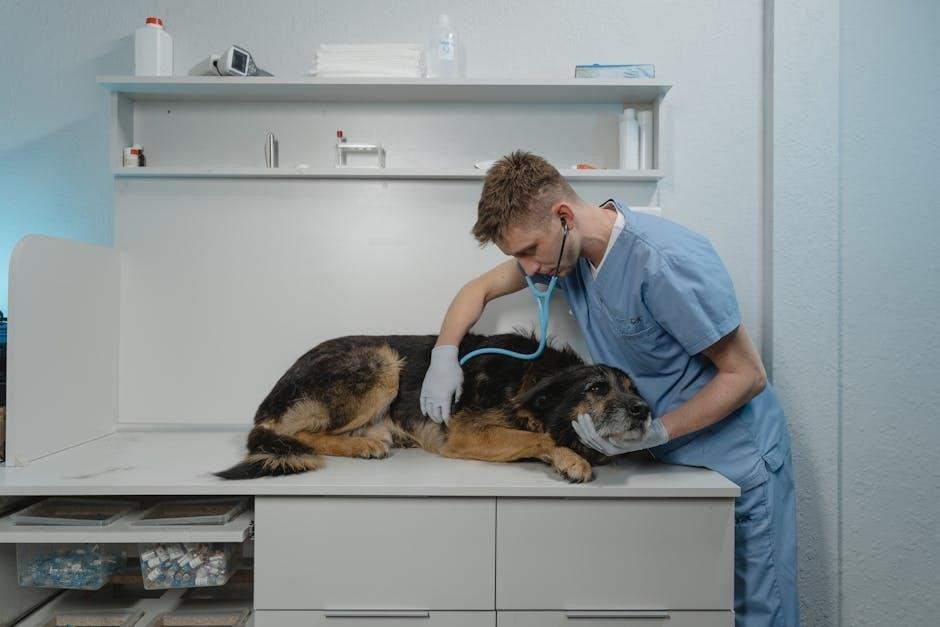
pharmacy tech practice exam pdf
Pharmacy technician practice exams are essential tools for preparing for certification. They simulate real exam conditions, helping candidates assess readiness and identify areas for improvement. Available in PDF formats, these resources offer convenient, accessible study materials to master pharmacy laws, pharmacology, and patient care skills. Regular practice builds confidence and ensures a thorough understanding of exam content.
1.1 Overview of the Pharmacy Technician Certification Exam (PTCE)
The Pharmacy Technician Certification Exam (PTCE) is a critical assessment for aspiring pharmacy technicians, administered by the Pharmacy Technician Certification Board (PTCB). It evaluates knowledge in pharmacy regulations, pharmacology, patient care, and inventory management. The exam consists of 90 multiple-choice questions, with a 1-hour and 50-minute time limit. Candidates must demonstrate competence in handling prescriptions, understanding drug interactions, and adhering to legal standards. Passing the PTCE earns the Certified Pharmacy Technician (CPhT) credential, enhancing career opportunities and professional credibility. Practice exams in PDF formats are widely used for effective preparation and familiarization with the exam structure.
1.2 Importance of Practice Exams in Preparation
Practice exams are indispensable for pharmacy technician certification preparation. They simulate real exam conditions, enabling candidates to assess their readiness and identify knowledge gaps. By mimicking the actual test format, practice exams help familiarize individuals with question types, timing, and content structure. Regular use of practice exams in PDF formats allows for targeted study, reinforcing understanding of critical topics like pharmacy laws, pharmacology, and patient care. Additionally, practice exams build confidence, improve time management, and reduce test anxiety, ensuring candidates are well-prepared for the PTCE and their future roles as certified pharmacy technicians.
1.3 Benefits of Using PDF Formats for Study Materials
PDF formats for pharmacy technician practice exams and study materials offer numerous benefits. They are easily accessible, portable, and can be viewed on multiple devices without formatting issues. PDFs allow for offline study, making them ideal for candidates with limited internet access. Additionally, PDFs are often searchable, enabling quick navigation and review of specific topics. They also provide a clean, professional layout that enhances readability. Furthermore, PDFs are environmentally friendly and can be easily shared or printed, making them a convenient and practical choice for exam preparation. This format ensures seamless access to essential study resources anytime, anywhere.

Understanding the Exam Format
The pharmacy technician exam format includes multiple-choice questions, with a set time limit. Understanding the structure and content helps candidates prepare effectively and manage their time wisely.
2.1 Structure and Content of the PTCE
The PTCE consists of multiple-choice questions assessing knowledge and application skills. It covers pharmacy regulations, pharmacology, operations, patient care, inventory, and compounding. The exam includes 90 questions, with a 1-hour 50-minute time limit. Practice exams mirror this structure, helping candidates familiarize themselves with content and timing. They also highlight areas needing review, ensuring thorough preparation. Regular practice builds confidence and improves problem-solving abilities, essential for success on the actual exam.
2.2 Types of Questions and Timing
The PTCE features multiple-choice questions designed to test knowledge and application skills. Candidates face 90 questions within 1 hour and 50 minutes. Practice exams replicate this format, helping candidates adapt to the time constraints and question types. They include straightforward and applied knowledge questions, ensuring comprehensive preparation. Timing strategies learned through practice exams are crucial for managing stress and completing the exam efficiently. Familiarizing oneself with the question format and pacing enhances confidence and performance, making practice exams an indispensable study tool.
2.3 Scoring System and Passing Requirements
The Pharmacy Technician Certification Exam (PTCE) uses a scoring system where candidates receive a scaled score between 0 and 100. To pass, candidates must achieve a minimum score of 70%. Practice exams mirror this system, allowing candidates to understand how their performance translates to the actual exam. Upon passing, candidates earn the Certified Pharmacy Technician (CPhT) designation, enhancing their career prospects. Retakes are permitted after a 60-day waiting period if the initial attempt is unsuccessful. Understanding the scoring system through practice exams helps candidates set realistic goals and improve their readiness for the certification exam.

Key Content Areas Covered on the Exam
The exam covers pharmacy regulations, pharmacology, operations, patient care, inventory management, compounding, and communication skills, ensuring comprehensive knowledge of pharmacy technician responsibilities and practices.
3.1 Pharmacy Regulations and Laws
Pharmacy regulations and laws are critical for ensuring safe and legal drug distribution. These include controlled substance management, patient privacy laws like HIPAA, and medication error reporting. Technicians must understand federal and state-specific rules, such as the Drug Quality and Security Act, to maintain compliance. Knowledge of legal guidelines for prescription filling, inventory control, and record-keeping is essential. Violations can lead to penalties, making it vital for technicians to stay updated on changing laws and ethical practices in pharmacy operations.
3.2 Pharmacology and Drug Therapy
Pharmacology and drug therapy are fundamental to a pharmacy technician’s role, focusing on understanding drug classifications, mechanisms of action, and therapeutic uses. Technicians must recognize drug interactions, side effects, and contraindications to ensure safe dispensing. Knowledge of drug indications, dosages, and formulations is crucial, particularly for high-risk medications like opioids and anticoagulants. Additionally, technicians must be familiar with generic and brand-name equivalents, as well as special considerations for pediatric and geriatric patients. Accurate drug identification and patient counseling skills are also essential to promote adherence and minimize adverse reactions. This expertise ensures effective and safe medication therapy for patients.
3.3 Pharmacy Operations and Management
Pharmacy operations and management involve coordinating daily tasks to ensure efficient workflow and patient satisfaction. Key responsibilities include managing inventory, supervising staff, and maintaining compliance with regulations. Technicians must understand how to handle cash transactions, process prescriptions accurately, and maintain patient records securely. Effective communication with pharmacists, other healthcare professionals, and patients is crucial. Strong organizational skills are necessary to manage multiple tasks simultaneously while adhering to safety protocols and quality standards. Proficiency in pharmacy software systems is also essential for streamlining operations and improving overall efficiency in a fast-paced environment.
3.4 Patient Care and Communication Skills
Patient care and communication skills are vital for pharmacy technicians to ensure effective interactions with patients and healthcare teams. This includes providing clear medication instructions, addressing patient concerns, and ensuring understanding. Technicians must demonstrate empathy, active listening, and cultural competence. Effective communication helps build trust and improves patient outcomes. Additionally, technicians should be able to explain medication side effects, proper usage, and potential interactions. Strong interpersonal skills are essential for resolving conflicts and ensuring patient satisfaction. These skills are tested in practice exams to prepare technicians for real-world patient interactions and collaborative healthcare environments.
3.5 Inventory Management and Control Systems
Inventory management and control systems are critical for maintaining accurate stock levels and ensuring efficient pharmacy operations. Pharmacy technicians must understand how to track inventory, monitor expiration dates, and prevent stockouts or overstocking. This includes using automated systems, barcode scanning, and manual counts to verify stock levels. Effective inventory control minimizes errors, reduces waste, and optimizes resource allocation. Proper handling of controlled substances and adherence to regulatory requirements are also essential. These skills are often tested in practice exams to ensure technicians can manage inventory efficiently and maintain compliance with legal standards in real-world scenarios.
3.6 Sterile and Non-Sterile Compounding
Sterile and non-sterile compounding are fundamental skills for pharmacy technicians, ensuring the preparation of safe and effective medications. Sterile compounding involves aseptic techniques to prepare injectable or intravenous medications, requiring strict adherence to infection control protocols. Non-sterile compounding focuses on mixing, measuring, and preparing medications in various forms, such as ointments or suspensions. Both processes demand precision, attention to detail, and knowledge of quality control measures. Practice exams often include questions on compounding procedures, emphasizing the importance of proper techniques, regulatory compliance, and patient safety. Mastery of these skills is critical for technicians to ensure accurate and safe medication preparation.

Effective Study Strategies
Effective study strategies involve active learning, flashcards, and group discussions. Utilize online resources, create schedules, and practice consistently to build confidence and mastery for the exam.
4.1 Creating a Study Schedule
Creating a structured study schedule is crucial for effective exam preparation. Allocate specific time slots for each topic, ensuring balanced coverage of pharmacy laws, pharmacology, and patient care. Set realistic goals and deadlines to avoid overwhelm. Prioritize challenging areas and track progress. Consistency is key; regular study sessions enhance retention and reduce cramming. Utilize practice exams to simulate real test conditions, focusing on time management and question types. Incorporate breaks to maintain focus and prevent burnout. Adjust the schedule as needed to address weaknesses and ensure thorough preparation for the pharmacy technician certification exam.
4.2 Active Learning Techniques
Engage with study materials through active learning techniques to enhance retention and understanding. Use flashcards to memorize key terms and concepts, such as drug classifications and pharmacy regulations. Practice problem-solving by working through practice exam questions, which helps apply knowledge in real-world scenarios. Teach the material to others or explain it aloud to reinforce learning. Incorporate group discussions or online forums to explore complex topics collaboratively. These methods promote deeper comprehension and improve critical thinking skills, essential for success on the pharmacy technician certification exam and in daily practice. Consistent application of these techniques ensures long-term mastery of the material.
4.3 Utilizing Flashcards for Memorization
Flashcards are a powerful tool for memorizing key terms, drug names, and pharmacy regulations. Write the term on one side and the definition or explanation on the other. Use spaced repetition to review cards at increasing intervals, enhancing long-term retention. Digital flashcard apps like Quizlet offer convenience and portability. Focus on active recall by testing yourself without looking at the answers. Pair flashcards with practice exams to reinforce learning. Regular use improves familiarity with exam content, ensuring better retention and confidence for the pharmacy technician certification exam. Consistency is key to mastering complex pharmacology and legal concepts.
4.4 Joining Study Groups or Online Communities
Joining study groups or online communities provides valuable opportunities for collaborative learning and mutual support. These platforms allow pharmacy technician candidates to discuss challenging topics, share study materials, and gain insights from peers. Online forums and social media groups dedicated to pharmacy technician certification offer a space to ask questions and learn from others’ experiences. Participating in these communities can enhance understanding, reduce isolation, and boost motivation. Active engagement with others preparing for the exam fosters a sense of camaraderie and shared purpose, ultimately contributing to better exam preparation and outcomes.

Practice Exam Resources
Pharmacy technician practice exams in PDF format are widely available online, offering convenient access to study materials. Reputable websites provide comprehensive practice tests, ensuring thorough preparation for the certification exam by covering all essential topics and question types. These resources are designed to simulate real exam conditions, helping candidates build confidence and familiarity with the exam format. Utilizing these materials is a proven way to enhance study effectiveness and achieve success in becoming a certified pharmacy technician.
5.1 Recommended Websites for PDF Practice Exams
Several websites are highly recommended for accessing pharmacy technician practice exams in PDF format. Quizlet, PTCB, and Pharmacy Technician Guide offer comprehensive practice tests that closely resemble the actual certification exam. These resources provide detailed questions, answer explanations, and cover essential topics such as pharmacy laws, pharmacology, and patient care. Additionally, websites like ExamGuide and PharmaTech offer free and paid PDF materials, ensuring candidates can choose resources that best fit their study needs. Using these reputable sites ensures a well-rounded preparation for the PTCE, helping candidates achieve their certification goals effectively.
5.2 Paid vs. Free Resources: Pros and Cons
When choosing between paid and free pharmacy technician practice exam resources, it’s important to weigh their pros and cons. Paid resources often provide more comprehensive and updated materials, including detailed explanations and performance tracking, which can enhance learning. However, they may be costly for some candidates. Free resources, while budget-friendly, might lack depth or regular updates. A balanced approach, combining free materials for initial preparation with paid resources for in-depth review, can optimize study effectiveness. This strategy ensures access to both affordability and quality, catering to different learning needs and preferences.
5.3 How to Choose the Best Practice Exam Materials
Selecting the best pharmacy technician practice exam materials involves evaluating key criteria. Look for resources that align with the exam format and content, such as question types and timing. Ensure the materials are regularly updated to reflect current standards and laws. Opt for platforms offering detailed answer explanations to enhance understanding. Consider the reputation of the provider and user reviews for reliability. Additionally, check if the materials include features like progress tracking or interactive elements. Prioritize resources that cover a wide range of topics, such as pharmacology, regulations, and patient care, to ensure comprehensive preparation.

Test-Taking Strategies
Effective test-taking strategies involve managing time wisely, staying calm under pressure, and approaching each question type with confidence. Practice exams help refine these skills, ensuring overall success.
6.1 Time Management During the Exam
Effective time management is crucial during the pharmacy technician exam. Allocate a set amount of time to each question, ensuring you leave enough to complete the entire exam. Practice exams help you refine this skill, allowing you to gauge your pace and adjust accordingly. Skip difficult questions initially and return to them later to avoid wasting time. Use the process of elimination to increase efficiency, and review your answers if time permits. A well-structured plan ensures you maximize your score and minimize exam anxiety.
6.2 Approaches to Different Question Types
Different question types require tailored strategies. For multiple-choice questions, read each option carefully and eliminate incorrect answers before selecting the best choice. True/false questions often test factual knowledge, so focus on memorized details. Fill-in-the-blank questions demand precise recall of terms or calculations. Practice identifying question patterns and prioritize understanding the reasoning behind each answer; Regularly reviewing practice exams helps refine these skills, ensuring you adapt effectively to various question formats. This targeted approach enhances accuracy and boosts confidence in tackling diverse exam challenges.
6.3 Managing Stress and Staying Focused
Managing stress and maintaining focus during exams is crucial for success. Practice deep breathing exercises to calm nerves and improve concentration. Break study sessions into manageable chunks and incorporate regular breaks to avoid burnout. Use positive affirmations to build confidence and reduce anxiety. Stay hydrated and maintain a healthy diet to support cognitive function. Prioritize sleep to ensure mental clarity. Familiarize yourself with the exam environment through practice exams to minimize stress. Remember, consistent preparation and a positive mindset are key to staying focused and performing well under pressure.
Analyzing Practice Exam Results
Analyzing practice exam results helps identify strengths and weaknesses, allowing focused study on areas needing improvement. Understanding incorrect answers enhances learning and boosts future performance and confidence.
7.1 Identifying Strengths and Weaknesses
Identifying strengths and weaknesses through practice exams is crucial for targeted study. Reviewing correct answers reinforces knowledge, while focusing on incorrect ones highlights areas needing improvement. This process ensures efficient use of study time, allowing candidates to build on their strong points and address gaps in understanding. Regular analysis of results helps track progress and refine study strategies, ultimately leading to better performance on the actual certification exam and increased confidence in one’s abilities as a pharmacy technician.
7.2 Creating a Plan to Address Weak Areas
After identifying weaknesses through practice exams, create a structured plan to address them. Prioritize weak areas and allocate more study time to those topics. Use targeted resources like flashcards or study guides to deepen understanding. Set specific, achievable goals for improvement and track progress regularly. Regularly review and adjust the study plan based on exam results and evolving needs. This focused approach ensures efficient learning and gradual mastery of challenging topics, leading to overall improvement and confidence in tackling the certification exam effectively.
7.3 Tracking Progress Over Time
Tracking progress over time is crucial for gauging improvement and staying motivated. Regularly review practice exam results to monitor score increases and identify persistent weaknesses. Maintain a record of incorrect answers to analyze recurring errors and adjust study strategies accordingly; Celebrate small milestones to stay encouraged and focused. Over time, observe how consistent practice enhances understanding and boosts confidence. Use this data to refine study plans and ensure steady advancement toward exam readiness. Progress tracking helps create a clear path to success in the pharmacy technician certification exam. Consistency is key to achieving long-term goals. Stay committed and patient throughout the process.

Common Challenges and Solutions
Common challenges include time management, understanding complex topics, and test anxiety. Solutions involve creating study schedules, using active learning techniques, and practicing relaxation methods to stay focused.
8.1 Difficulty with Time Management
Many candidates struggle with time management during pharmacy technician practice exams. To overcome this, create a study schedule with dedicated blocks for each topic. Use timers during practice exams to simulate real-test conditions, ensuring you allocate enough time for each question. Break down study sessions into shorter intervals with breaks to maintain focus. Prioritize challenging areas and review time-saving strategies, such as skimming questions and eliminating obvious wrong answers. Regular practice builds speed and confidence, helping you manage time effectively during the actual exam.
8.2 Struggling with Certain Topics
Some pharmacy technician candidates find specific topics challenging, such as pharmacology or pharmacy regulations. To address this, focus on breaking down complex subjects into smaller, manageable sections. Use PDF study guides to review difficult areas thoroughly. Engage in active learning by creating flashcards or concept maps to reinforce understanding. Join study groups or online forums for additional support and alternative explanations. Prioritize weak areas in your practice exams and seek detailed answer explanations to clarify misconceptions. Regular review and targeted practice can help overcome these struggles and improve overall performance. Consistent effort is key to mastering tough topics.
8.3 Overcoming Test Anxiety
Test anxiety can significantly impact performance on pharmacy technician exams. To manage this, practice relaxation techniques such as deep breathing or visualization. Establish a consistent study routine to build confidence and familiarity with exam content. Utilize PDF practice exams to simulate test conditions, helping you become comfortable with the format and timing. Stay positive and remind yourself of your preparation efforts. Engaging in regular physical activity and ensuring adequate rest can also reduce stress levels. Seek support from peers or mentors to discuss concerns and gain reassurance. Remember, anxiety is common, but proactive strategies can help you stay focused and calm during the exam.

The Role of Pharmacy Technician Certification
Pharmacy technician certification validates skills, enhances credibility, and boosts career opportunities. It demonstrates commitment to professional standards, ensuring patient safety and effective practice. Certified technicians are in high demand, as certification signifies a strong foundation in pharmacology, laws, and patient care.
9.1 Career Advancement Opportunities
Obtaining pharmacy technician certification opens doors to advanced roles and specialized positions. Certified technicians can pursue senior roles, such as lead technician or pharmacy supervisor. Opportunities in hospitals, clinics, and specialized pharmacies increase, offering higher responsibility and autonomy. Certification also prepares technicians for roles in medication therapy management or clinical support. Additionally, it serves as a stepping stone for those aiming to become pharmacists. The credential enhances job prospects and positions technicians as invaluable assets in healthcare teams, fostering long-term career growth and professional satisfaction.
9.2 Higher Salary Potential
Certified pharmacy technicians often earn higher salaries compared to their non-certified counterparts. According to industry reports, certification can lead to a significant increase in annual income, with averages ranging from $10,000 to $15,000 more per year. This financial benefit is a direct result of the specialized skills and knowledge demonstrated through certification. Employers recognize the value of certified technicians, leading to better compensation packages. Additionally, higher salaries are more common in specialized settings like hospitals or clinical pharmacies, further incentivizing certification for career growth and financial stability.
9.4 Increased Job Security
Certification as a pharmacy technician significantly enhances job security in a competitive healthcare job market. Employers often prioritize certified candidates, as it demonstrates expertise and commitment to professional standards. This makes certified technicians more indispensable, reducing the risk of job instability. Additionally, certification opens doors to specialized roles and promotions, further solidifying career stability. With the growing demand for skilled pharmacy technicians, certification acts as a protective factor, ensuring long-term employment opportunities and career resilience in an evolving healthcare landscape.
Pharmacy technician practice exams are crucial for certification success. Regular practice enhances understanding, builds confidence, and ensures readiness. Invest time in preparation to excel in your career and secure your future in pharmacy technology.
10.1 Final Tips for Success
To excel in your pharmacy technician certification exam, stay updated on pharmacy practices and regulations. Regularly review practice exams to identify and improve weak areas. Utilize flashcards for quick memorization of key terms and concepts. Manage your time effectively during the exam to ensure you answer all questions. Join study groups for collaborative learning and support. Stay positive and maintain a healthy work-life balance to avoid burnout. Consistent practice and dedication will lead to success and a rewarding career as a certified pharmacy technician.
10.2 Encouragement and Motivation
Remember, becoming a certified pharmacy technician is a significant achievement that opens doors to a fulfilling career. Stay motivated by celebrating small victories during your preparation journey. Leverage success stories from others who have passed the exam to inspire your efforts. Embrace challenges as opportunities to grow and improve. Keep a positive mindset and remind yourself of the rewards that certification brings, such as career advancement and increased confidence. With persistence and dedication, you can overcome any obstacle and achieve your goal of becoming a skilled pharmacy technician.